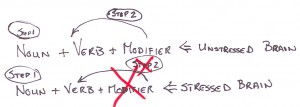I’m going to give you two sentences to think about.
- “Please feel free to contact me if you have questions.”
- “Please don’t hesitate to contact me if you have questions.”
Those say the same thing, don’t they? Technically, they do. But the problem comes in with how they’re worded and how the brain deals with them.
When psychologists do research on memory and processing, they usually have some sort of a stress component. They’ll use a task to put the brain under a load, because that’s how the brain is usually working. You’re rarely fully focused on a task. You’re probably thinking about something else while you’re working, or you’re having to work quickly. As a general rule, you’re not perfectly focused on a task and nothing else, especially at work.
A very pertinent example of this and how this post fits in very well is linked with how long people spend reading a web page. On average, a typical person browsing the internet actually reads only about 28% of the information on the screen. In most cases, people scan what’s on the screen. This becomes more important as you consider how the brain processes negative modifiers.
When your brain encounters a sentence like “Please feel free to contact me, if you have any questions” it processes the noun (“me”) and the verb (“contact”) for meaning before it processes anything else. When the brain is under a cognitive load, (for instance at work, scanning a web page) the brain may stop there. So, when you toss in a negative modifier (“not”), then the brain might miss it. So, the big take-away for a scanner from the sentence “Please don’t hesitate to contact me if you have questions,” can be “hesitate.”
The brain has to process the first phrase to be able to apply the negative modifier and understand it, so in cases where the brain is under a cognitive load, the negative modifier can be missed. A number of researchers have tested this and found that this holds true in written language, as well as spoken language. So, the fix here is to take care in how often you use negative modifiers and in what situations. If you’re in a high stress situation and you’re giving someone instructions, teach yourself to give positively worded instructions, not ones using negative modifiers. The chance that you’ll be misunderstood will be much lower, and your stress level should be decreased as well because of fewer mistakes.

